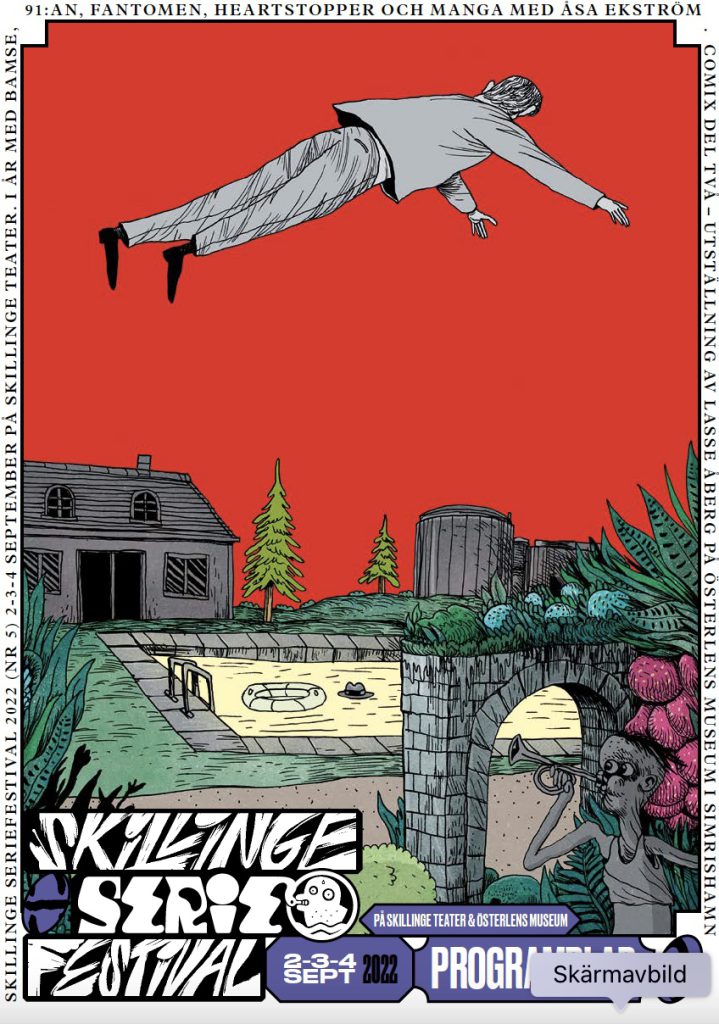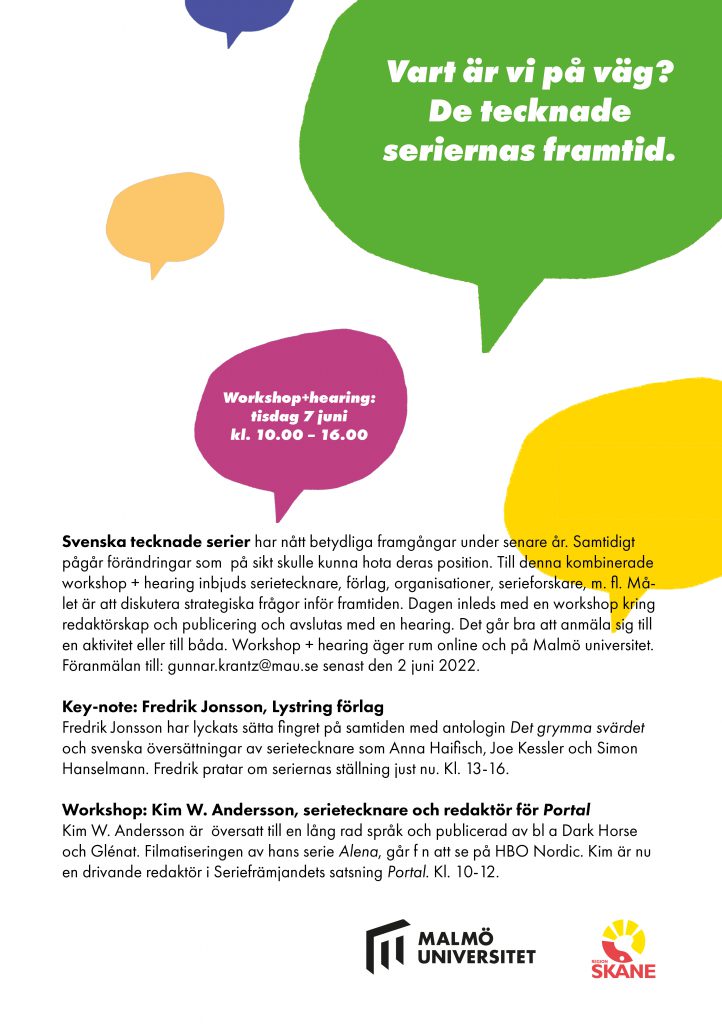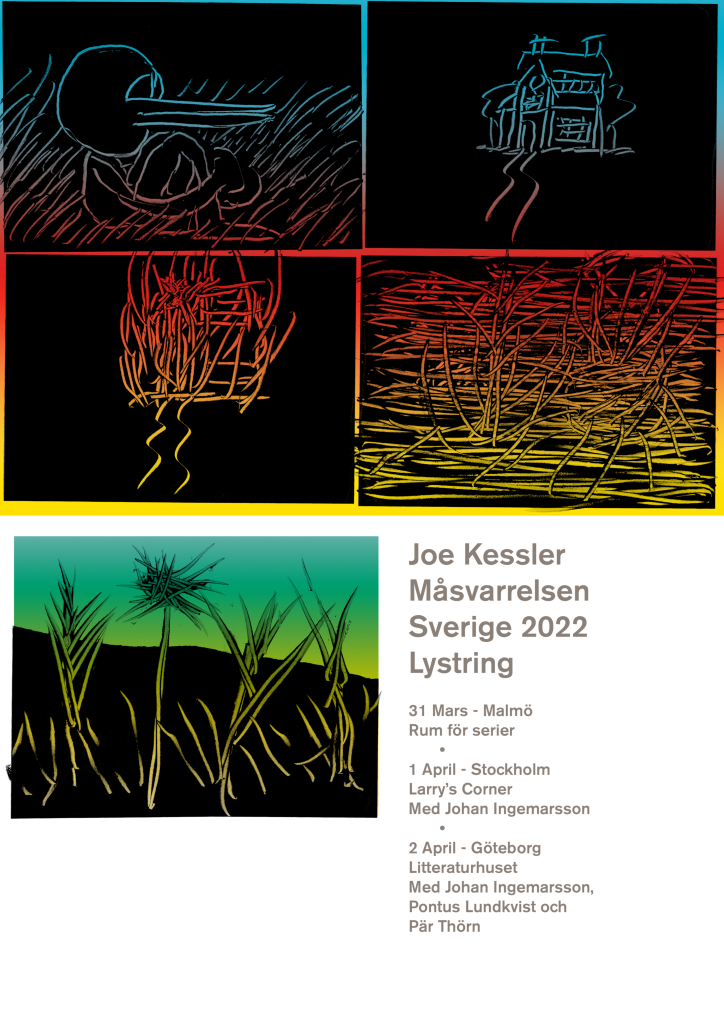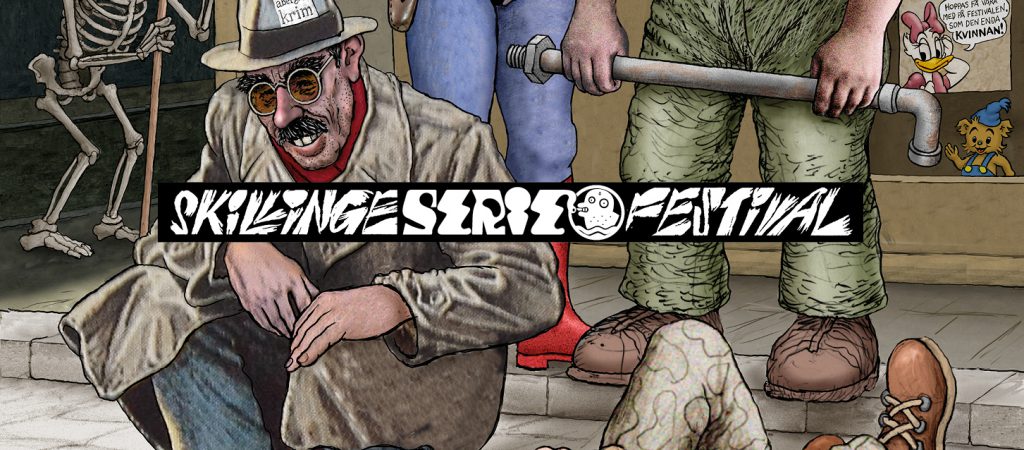The newest volume of Arne Anka has been published and is available via https://arneanka.org

It is published by Charlie Christensen via his own new publisher Zeke’s Förlag.
Great things happen in comics-Sweden!
The newest volume of Arne Anka has been published and is available via https://arneanka.org

It is published by Charlie Christensen via his own new publisher Zeke’s Förlag.
Great things happen in comics-Sweden!
2 september 2022

Fullständigt program i pdf-format: https://comics.uni.mau.se/wp-content/uploads/sites/20/2022/08/2022_PROG_SKF_6_WEB.pdf
PROGRAM FREDAG 2/9:
Skillinge teater och zoom. Alla tider CET.
Zoom-länk: https://mau-se.zoom.us/j/66664381357
10:00 – 11:00
Titel: Serier och sinnesintryck i skolan
Lars Wallner, universitetslektor, Institutionen för beteendevetenskap och lärande (IBL), Linköpings universitet.
11:00 – 12:00
Titel: Självsyn och världsbild i tecknade serier
Kristina Arnerud Mejhammar, intendent vid Norrköpings konstmuseum.
12.00 – 13.00
Titel: Visuella genealogier i Persepolis – persisk konst och den franska nya vågen.
Fredrik Strömberg, journalist, författare och fil. doktor i Medie- och kommunikationsvetenskap
LUNCH
14.00 – 15.00
Titel: Manga, en affektiv form av serier
Jaqueline Berndt, professor i Japans språk och kultur, Stockholms universitet.
15.00 – 16.00
Titel: Svenska feministiska serier och aktivism
Anna Nordenstam, professor i litteraturvetenskap, Göteborgs universitet och Margareta Wallin Wictorin, docent i konst- och bildvetenskap, Karlstads universitet
16.00 – 17.00
Titel: Serier i fackförbundspressen
Magnus Nilsson, professor i komparativ litteratur, Institutionen för Konst, Kultur och Kommunikation, K3, Malmö universitet.
Welcome to a K3 seminar with Berndt Clavier, Senior Lecturer in English Studies, K3, and Jakob Dittmar, Senior Lecturer and Docent in Media and Communication Studies, K3
The title of the talk is: Defining “Graphic Novels” with the Help of “the Novel” – Reflecting on Emerging and Established Literary Forms.
The seminar will take place on Wednesday, June 1 at 10.15-12.00. It will be a hybrid seminar. Please either come to NiB0501 or join online here: https://mau-se.zoom.us/j/64675687916 (this is the zoom link to all K3 seminars this term).
Below is an abstract for the seminar.
Narrative qualities of comics have become better understood with texts and images interweaving while offering different perspectives or focalisations in each image and different strands of texts. While different genres and styles are recognised in comics, a more differentiated approach to the distinct qualities of individual genres in graphic literature is needed if we want to understand and discuss these in their distinct graphic and narrative qualities that constitute their literary qualities, just like we discuss poetry and prose literature, film, and theatre – and their interrelations. The seminar looks into the use of the term graphic novel, into attempts to define it in different cultural contexts. The dominating approaches from Franco-Belgian as well as Ango-American comics research are discussed to develop a more substantial definition. For as soon as we look into comics narratives, they can be diversified into all kinds of things, but what we need to get into the discussion are aspects of graphiation and voice, as well as all the established criteria for understanding literature better.
Tisdag 7 juni kl 10-16 Online och på Malmö universitet. Anmälan till: gunnar.krantz@mau.se senast den 2 juni 2022. (in swedish only).


Joe Kessler is presenting his new book Måsvarrelsen (The Gull Yettin) at Gallery/bookstore Rum för Serier, Friisgatan 12 in Malmö. Thursday March 31st. at 17.30-20.00 (PM).
Joe will discuss his work with Rojin Pertow, editor of Galago-magazine and show some recent drawings made in Malmö. All welcome! The talk will be streamed at: https://mau-se.zoom.us/j/63982083307
Dear friends,
over the past terms I have translated with my students a few Chinese lianhuanhua into English. While the first two appeared on MCLC, we have now set up a webpage within the ReadChina project to give access to some exemplary Chinese readings in translation. To be honest, credits for the webpage with all its gimmicks go to Duncan Paterson who made this possible and to Damian Mandzunowski who helped out a lot with design
ideas etc.
The page is available here: https://readchina.github.io/comics/ (or through the ReadChina main page).
I hope that you may find this a useful resource.
We are still doing a bit of polishing, so if something odd occurs, please let us know. Also, if you happen to have a translation that you would like to publish, we’d be happy to add this to the page.
Stay safe and happy!
All best,
Lena Henningsen (Freiburg University, Germany)

Comics Research lab/Serielab at Mau will visit Skillinge Comics Festival with a one-day long programme focussing on the comic-book as phenomenon. Presentations will be both in english and swedish and streamed via zoom on this link:
https://mau-se.zoom.us/j/61745981545
PROGRAMME:
09:30 – 10:00 (CET) Serietidningen – en fantastisk innovation.
Gunnar Krantz, professor i visuell kommunikation, Malmö universitet.
10:00 – 11:00 Fantomen och den nya vänstern.
Robert Aman, biträdande professor i pedagogik, Linköpings universitet.
Jacob Habinc,serietecknare och projektledare på Fantomentidningen, Story House Egmont.
11:00 – 12:00 Arne Anka som samtidsdokumentär.
Charlie Christensen, serietecknare och skapare till Arne Anka.
Jakob Dittmar, docent i Medie- och kommunikationsvetenskap, Malmö universitet.
13:30 – 15:00 Vuxenserier och moralpanik.
Linnéa Lindsköld, docent i biblioteks- och informationsvetenskap, Högskolan i Borås.
Gunnar Krantz, professor i visuell kommunikation, Malmö Universitet.
16:00 – 17:00 Om undergroundtidningen PUSS
Carl Johan De Geer, konstnär, fotograf, författare, filmskapare och scenograf. Annika Olsson, docent i litteraturvetenskap, prefekt för Institutionen för Konst, Kultur och Kommunikation, K3, Malmö universitet.
Serielab at Mau is funded by Region Skåne.
Here is a link to the Vol. 17, Issue 2 of Participations, Journal of Audience and Reception Studies – this issue focuses on Fandom and Comics:
https://www.participations.org/Volume%2017/Issue%202/contents.htm
Check it out!
Comics Research at MaU is combining artistic research and approaches that utilise analytic methods from diverse subjects (currently mostly Literature, Visual Communication, Cultural Studies, Science of Arts, Media and Communication Studies).
The focus of our comics research is on narratives and how they are executed, how visual and textual elements are interlinked to be read. While theories and analyses of specific examples allow us to understand much about comics, some issues and theories need to be tested in application, productions. While artistic research allows us to advance our understanding of comics production and the expression of distinct voices, reflections on experimental productions allow us to question specific aspects of comics theory and develop theories further.